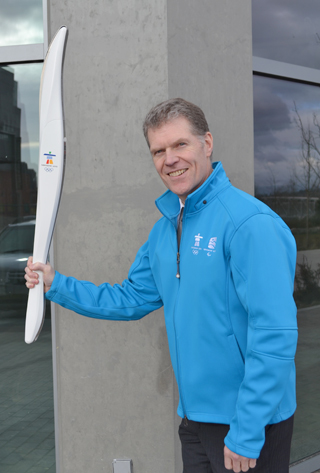Olympic Memories: Mike Madill
Olympic Memories: Mike Madill

We’re going back four years in our collective memories and visiting the 2010 Winter Olympic Games for our Olympic Memories series.
For this instalment, I sat down for a short interview with TransLink’s VP of Enterprise Initiatives, Mike Madill, and asked him about his experience of the 2010 Winter Olympics and how that experience contributes to his work on Compass Card.
Tell me what you did during the Games.
In 2008, I started in a new role as Vice President, Olympic Transportation for TransLink. I had the privilege to lead TransLink’s core team in terms of doing all of the organizing for TransLink’s responsibilities during the Games. We had an awesome core team.
How do you start something like that?
The first step in planning was to understand what was needed. Some planning started before 2008, but there was lots to be done.
What did you learn from the Games?
I learned so much during the Games. I was working for Coast Mountain Bus Company before that role, so I learned a lot about TransLink and how it worked.
What I learned from my Winter Olympic experience is that you need to have a good, well thought out plan. It needed to include everything. It needed to include not just the operations and how to deliver service during the Games. It needed to include a plan for how to manage the crowds, get people out of their cars and onto transit (transportation demand management) all while accommodating the crowds in downtown Vancouver. The plan also included all the communications, marketing and public education about transit services during the Games.
It was a massive job that took more than just the core team to deliver. The key to making it work as well as it did was for everyone to work together – all of TransLink and its operating company staff working together to make it happen. Everyone was working towards one specific goal. We all had a lot of things on the go. But during the lead up to the event, the Games became the priority, right from the top of the organization. The focus during those 17 days was to make the Games experience great.
We had teams of employees all of over Metro Vancouver helping to support this effort. I think some people who usually only work in an office environment were nervous about getting out and being on the front lines. But once people were outside and mingling with the crowds, most people really enjoyed the experience.
What’s your best memory from that time?
My best memory was probably just the feeling in the streets. The streets were so alive and jammed with people. It was a really positive atmosphere and nice vibe. It was tricky at the beginning for us. We had to work through and adapt to the changes during the first week of the Games. We had to figure out how to manage the crowds at Waterfront Station and other areas. But by the second week, we hit our stride and everything was working. I was out on the system pretty much everyday of the Games connecting with staff and watching it all happen – making sure everyone had what they needed.
The Winter Olympics was obviously a big project to work on. How does that experience relate to your new big project, Compass Card?
Well, learning during the Games how TransLink and the operating companies work really helped. Also understanding the value of good planning and good communication has helped. When looking at the organization internally, understanding the value of good change management has been key. Understanding that employees need to understand what’s going on and giving them the tools to tell others outside of the organization about the changes coming to our transit system is really important. Also, understanding crowds in the transit stations during the Games is helping plan for the transition from our current system to the Compass system.
How was planning for the Olympics different from preparing for Compass Card?
Compass is a lot bigger than the Olympics scope wise. With the Olympics, we had a hard deadline. With Compass, we also have deadlines, but we have flexibility too–if we feel things aren’t right for the customer yet, we can reassess and take the steps and time needed to get it right for customers.
Thanks for the time, Mike!







Will the Buzzer Blog be profiling any visible minorities for the Olympic Memories series?
Hello Joe: It depends who you consider to be a visible minority. I have a couple more posts to publish in this series. Thanks for the question!